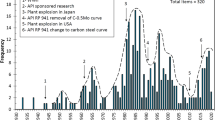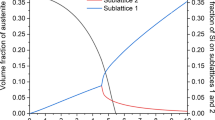Abstract
In this study, experimental tests were performed to investigate the strain aging behavior of X100 pipeline steel in service and the resulting enhancement of susceptibility of pipelines to stress corrosion cracking (SCC). Results demonstrated that an immediate rise in temperature during coating application could result in strain aging of X100 steel, as indicated by increasing strength and decreasing elongation as well as the presence of Lüders strain during yielding. The aged steel is associated with an enhanced cracking susceptibility under cathodic protection potentials. It is believed that strain aging is able to enhance hydrogen evolution and the further permeation into steel, resulting in hydrogen-induced SCC of the steel.








Similar content being viewed by others
References
K.T. Corbett, R.R. Bowen, and C.W. Petersen, High Strength Steel Pipeline Economics, Int. J. Offshore Polar Eng., 2004, 14, p 75–79
D.M. Duan, J. Zhou, and D. Horsley, SA Effect in High Strength Line Pipe Materials, Proceedings of the 7th International Pipeline Conference, IPC 2008-64427, ASME, Calgary, 2008
R.E. Sanjuan, “Studies of Corrosion and Stress Corrosion Cracking Behavior of High-Strength Pipeline Steels in Carbonate-Bicarbonate Solutions,” Master of Science Degree Thesis, University of Calgary, 2008
X. Wu, “Strain-Aging Behavior of X100 Line-Pipe Steel for a Long-Term Pipeline Service Condition,” Master of Science Degree Thesis, University of Calgary, 2010
Y. Frank Cheng, Stress Corrosion Cracking of Pipelines, John Wiley Publishing, New York, 2013
N. Ishikawa and M. Okatsu, Material Development and Strain Capacity of Grade X100 High Strain Line-Pipe Produced by Heat Treatment Online Process, Proceedings of the 7th International Pipeline Conference, Paper IPC 2008-64507, ASME, Calgary, 2008
J. Johnson, M. Hudson, and N. Takahashi, Specification and Manufacturing of Pipes for the X100 Operational Trial, Proceedings of the 7th International Pipeline Conference, Paper IPC 2008-64653, Calgary, 2008
ASTM (American Society for Testing and Measurements) E8-04, Standard Test Method for Tension Testing of Metallic Materials, 2004
National Energy Board, Report of Public Inquiry Concerning Stress Corrosion Cracking on Canadian Oil and Gas Pipelines, MH-2-95, Calgary, 1996
ASTM (American Society for Testing and Measurements) E23-05, Standard Test Method for Notched Bar Impact Testing of Metallic Materials, 2005
G.E. Dieter, Mechanical Metallurgy, 2nd ed., McGraw-Hill Publishing, New York, 1976
R.E. Reed-Hill, Physical Metallurgy Principles, 2nd ed., D. van Nostrand Company, New York, 1973
M.R. Gokhman, Temperature Regime of Permafrost in the Bed of a Gas Pipeline, Soil Mech. Found. Eng., 1983, 20, p 15–17
Author information
Authors and Affiliations
Corresponding author
Rights and permissions
About this article
Cite this article
Liang, G., Peng, X., Juan, E.S. et al. Strain Aging of X100 Steel in Service and the Enhanced Susceptibility of Pipelines to Stress Corrosion Cracking. J. of Materi Eng and Perform 22, 3778–3782 (2013). https://doi.org/10.1007/s11665-013-0683-z
Received:
Revised:
Published:
Issue Date:
DOI: https://doi.org/10.1007/s11665-013-0683-z




